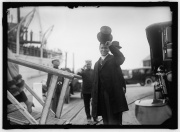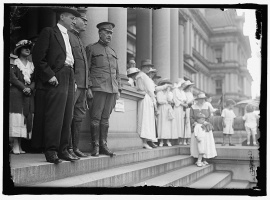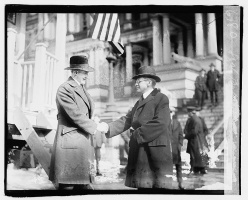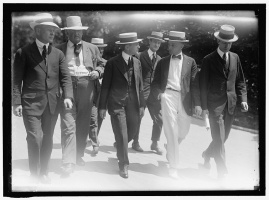Wilson’s unlikely choice↑
When President Woodrow Wilson (1856-1924) asked Newton D. Baker (1871-1937) to serve as Secretary of War in March 1916, Americans were heatedly debating the dual issues of preparedness and neutrality. A 5’6” tall West Virginia-born lawyer, Baker was a Progressive Democrat who had opposed a 1904 plan to expand the Navy, and been involved in groups such as the League to Enforce Peace. To many in the military and beyond, his qualifications for the vacancy seemed questionable. What could a former mayor of Cleveland, Ohio – who had mandated city control of the local orchestra so the masses could enjoy wholesome entertainment – know about directing an army? But to those who, like Wilson, understood the current conflict as a total war that extended well beyond battlefields, the appointment made perfect sense: a civilian with experience managing relationships between the government, business community, and larger public was perfectly suited for the monumental task at hand.
War↑
Following the U.S. declaration of war in April 1917, Baker mainly worked to mobilize the military in four areas: leadership, supplies, structure, and training.
Leading the Army↑
In May 1917, Baker studied the records of the Army’s major generals and chose John Pershing (1860-1948) as the wartime commanding general. Unlike other Army brass, Pershing had not publicly critiqued Wilson’s commitment to neutrality in the years prior. He also had a history of yielding to his political superiors while tactfully conducting military operations. The Secretary earned the respect of his martial colleagues by allowing his commanding general great autonomy, and by openly relying on career Army officers regarding military strategy.
Supplying the Army↑
More complex than declaring who would command American forces was ensuring they had satisfactory resources. To these ends, Baker advised Wilson to pursue civil-military cooperation. The result was the Council of National Defense (CND), created in August 1916.
The CND, chaired by Baker and charged with organizing the national economy for war, consisted of the Secretaries of the Navy, Agriculture, Commerce, and Labor. They elected and collaborated with seven citizen representatives of the National Defense Advisory Commission (NDAC). The latter group featured some of the country’s civic and business elites: the presidents of the Baltimore & Ohio Railroad and Sears Roebuck & Co. worked alongside a prominent banker and the president of the American Federation of Labor. The CND and NDAC were emblematic of Baker and fellow Progressives’ hope that government, business owners, and workers could cooperate to fulfill a mutually-held national mission.
Building the Army↑
In April 1917, the U.S. Army numbered just over 125,000 enlisted men and officers – miniscule in comparison to the forces of other major powers. Congress enacted conscription under the May 1917 Selective Service Act, which required that all men between the ages of twenty-one and thirty register to serve in the military. In an effort to dispel hostility to the law, Baker and his team focused on convincing Americans that Selective Service was different from general conscription: far from coercive, it was a means of organizing the efforts of a nation willing to come together for a common cause. They also ensured that the Act would be administered and overseen within local communities. That meant that requests for deferments from African Americans and poor immigrants and whites often did not receive a fair hearing.
Although many registrants received deferments based on familial, occupational, or health status, more than 70 percent of the 3.89 million service members inducted into the Army during the war were drafted.
Training the Army↑
Military service, Baker believed, should train men not only for fighting, but also for better citizenship. The Secretary thus created the Commission on Training Camp Activities, which devised programs that promoted health and moral and academic development, and aimed to limit soldiers’ exposure to prostitution, gambling, and liquor.
Baker’s determination to use training camps as carefully molded social environments was evident in his treatment of conscientious objectors (C.O.s). Although he expanded the terms of who could qualify as such, Baker mandated that all C.O.s report to training camps to perform non-combat duty, and undergo psychological testing and interrogation. After the war, Baker was proud that the majority of those who registered as conscientious objectors eventually served in combat roles, though it is unclear how many were coerced, rather than convinced, to do so.
Baker’s Legacy↑
Upon his death in 1937, Newton Baker was celebrated for mobilizing millions of recruits and abundant resources, but in the years surrounding World War I, he drew much criticism. Baker’s detractors initially faulted him for failing to properly prepare the Army, then accused him of wasteful spending on supplies, and finally argued that demobolization was inefficient. Some expressed disappointment that he had abandoned his pacifism.
But Baker’s values were largely consistent throughout his professional life. He counseled Woodrow Wilson during the Paris Peace Conference and, as he pursued a successful law career in the 1920s, tirelessly advocated for U.S. inolvement in the League of Nations as a means of avoiding the perils of war. Initiatives like the League, mandating city control of Cleveland’s orchestra, the Council of National Defense, Selective Service, and the Commission on Training Camp Activities were based on similar ideological foundations: the coalescence of the state and private industry for the so-called greater societal good, and the use of government resources to create a more peaceful world, and a healthy, educated populace. The archetypal Progressive, Baker bolstered the idea that the Army could do more than train men to fight; it could serve as an integral institution of the U.S. state by shaping the economy and promoting a specific brand of moral citizenship.
Jessica L. Adler, Florida International University
Section Editor: Lon Strauss
Selected Bibliography
- Baker, Newton Diehl: Why we went to war, New York 1936: Harper for the Council on Foreign Relations.
- Beaver, Daniel R.: Newton D. Baker and the American war effort, 1917-1919, Lincoln 1966: University of Nebraska Press.
- Craig, Douglas B.: Progressives at war. William G. McAdoo and Newton D. Baker, 1863-1941, Baltimore 2013: Johns Hopkins University Press.
- Cramer, C. H.: Newton D. Baker, a biography, Cleveland 1961: World Publishing Company.
- Palmer, Frederick: Newton D. Baker. America at war, volume 1-2, New York 1931: Dodd, Mead & Co.











